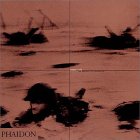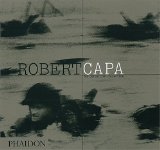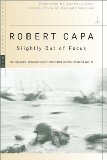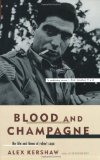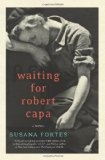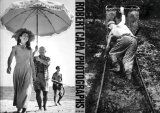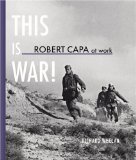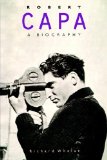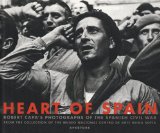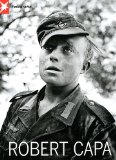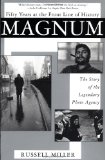The Mexican Suitcase
In 2007 a hoard of precious negatives turned up in Mexico.
A large quantity of negatives put into the hands of a Spanish general
towards the end of the Spanish Civil War and transported to Mexico, where
they sat in a cupboard for the next 75 odd years.
They were the works of David Seymour "Chim", Robert Capa, and his paramour
Gerda Tara, who was killed during the conflict.
There is an excellent documentary and a 750 page book, both with the
same name.
Robert
Capa : Photographs
by Henri Cartier-Bresson, et al
Hardcover - 191 pages
Aperture; ISBN: 0893816752
Robert
Capa: The Definitive Collection
by Richard Whelan
Book Description This is the first book to reproduce the definitive
set of 937 rarely seen and classic images of Robert Capa, one of the most
influential documentary photographers of the twentieth century.
Robert Capa (1913-54), one of the greatest photographers of the twentieth
century and a founding member of Magnum photographic agency, had the mind
of a passionate and committed journalist and the eye of an artist. His
lifework, consisting of more than 70,000 negative frames, constitutes an
unparalleled documentation of a crucial 22-year period (1932-54) encompassing
some of the most catastrophic and dramatic events of the last century.
This book represents the most definitive selection of Capa's work ever
published, 937 photographs meticulously selected by his brother, Cornell
Capa (himself a noted Life photographer), and his biographer, Richard Whelan.
The photographs, arranged in chronological order as stories and accompanied
by brief commentaries, reveal the dramatic shifts in location and subject
matter that Capa experienced from day to day--- from war-torn Israel to
Pablo Picasso on a sunny beach in France and from Ernest Hemingway carousing
in London to Capa's historic images of the Allied landing on Omaha Beach
in Normandy in 1944.
Hardcover: 571 pages ; Dimensions (in inches):
2.18 x 10.18 x 10.16
Publisher: Phaidon Press Inc.;
ISBN: 071484067X
Robert
Capa: The Definitive Collection
by Richard Whelan
Paperback from Phaidon Press
ISBN: 0714844497
Availability: Usually ships in 24 hours
Robert Capa (1913-1954), one of the greatest photographers of the twentieth
century and a founding member of the Magnum photographic agency, had the
mind of a passionate and committed journalist and the eye of an artist.
His lifework, consisting of more than 70,000 negative frames, constitutes
an unparalleled documentation of a crucial twenty-two-year period (1932-1954)
encompassing some of the most catastrophic and dramatic events of the last
century. This book represents the most definitive selection of Robert Capa's
work ever published, a collection of 937 photographs selected by Capa's
brother, Cornell Capa (himself a noted Life photographer), and his biographer,
Richard Whelan, who meticulously re-examined all of Robert Capa's contact
sheets to compile this master set of images. This book opens with a biographical
introduction illustrated with rare photographs of Capa, and closes with
a chronology of his life. The main body of the book presents this definitive
collection of 937 of Robert Capa's most important pictures. The photographs,
arranged in chronological order and accompanied by commentaries and identifying
captions, constitute an in-depth survey of Robert Capa's finest work over
the entire course of his career. The pictures reveal the dramatic shifts
in location and subject matter that Capa experienced from day to day, representing
the trajectory of his life - from war-torn Spain to Picasso on a sunny
beach in France; from carousing with Ernest Hemingway in London to Capa's
historic images of the Allied landing on Omaha Beach in Normandy in 1944.
The book design groups together pictures that constitute a story - for
example, the Popular Front rallies in Paris in 1936, or the U.S. Army's
entry into Sicily in 1943 - in order to maintain the original coherence
of the work. Embodying the spirit of his photographs, Robert Capa's life
itself was adventurous, romantic, and tragic. Born in Hungary in 1913,
he hoped to become a journalist but was forced to flee to Berlin at the
age of seventeen because of his leftist political sympathies. When Hitler
became chancellor of Germany in 1933, Capa fled to Paris, the city that
would become his home on and off for most of his life. It was there that
he met Andre Kertesz, who became a mentor to Capa and introduced him to
the extraordinary potential of the 35mm Leica camera as a tool for reportage.
Capa also met two other photographers during his early years in Paris:
Henri Cartier-Bresson and David "Chim" Szymin, with whom he founded Magnum,
the co-operative photo agency, in 1947 along with George Rodger and William
Vandivert. For the rest of his life, Capa would devote much of his time
to guiding the operations of the Magnum offices in Paris and New York.
Throughout the 1930s and World War II, Capa was present at many of the
twentieth century's defining events and moments. His first assignment came
in 1932, when he was working as a darkroom assistant at Delphot, the important
Berlin photo agency. The agency's director, recognizing Capa's talent,
lent him a camera and sent him to Copenhagen to photograph exiled Russian
revolutionary Leon Trotsky giving a speech to Danish students. From there,
Robert Capa went on to photograph the Spanish Civil War, when he made his
famous "Falling Soldier" picture showing a Republican soldier collapsing
just after being shot. Capa reported on the increasing political tensions
in Europe in the mid-1930s, including the Popular Front demonstrations
in France, and on the presidential elections in Mexico in 1940 before being
accredited by the U.S. Army as a war correspondent for Life. After documenting
Londoners' stalwart survival of the Blitz, he went on to cover battles
on many of the major fronts in North Africa, Sicily, mainland Italy, France,
and Germany. In one of his most famous assignments, Capa landed with the
first wave of American troops on Omaha Beach in Normandy on D-Day, June
6, 1944. Wading into the frigid water behind amphibious tanks, and dodging
machine gun and rifle bullets, Capa shot 36 exposures before his hands
were shaking so badly that he could not insert another roll into the camera.
In an ironic twist of fate, a Life darkroom attendant damaged all but eleven
of Capa's negatives. After the war, he did various stories for travel magazines
and worked on writing projects with friends such as John Steinbeck and
the noted journalist Theodore H. White. He also went to Israel several
times to document the conflict and co-operation in the founding of the
new nation. Capa's last assignment would be a trip to Vietnam to cover
the French Indochina War: he was killed when he accidentally stepped on
a Vietminh antipersonnel mine in the countryside on May 25, 1954. Though
perpetually broke, Capa lived a glamorous life - through a combination
of charm, luck, and talent (and an uncontrollable penchant for gambling),
he frequented a wealthy circle of celebrities and cultural figures. He
fell in love with Ingrid Bergman; was friends with Ernest Hemingway, the
director John Huston, and other writers and directors; spent many an afternoon
at the racetracks, and enjoyed all-night poker games. Seen together, however,
the pictures in this book transcend the specific situations they portray
to stand as timeless images of the human condition at its most terrible
and inspiring; they are monuments to the strength of the human spirit. |
| |
Slightly
Out of Focus (Modern Library War)
by Robert Capa
Paperback from Modern Library
Published: 2001-06-12
ISBN: 0375753966
Availability: Usually ships in 24 hours
In 1942, a dashing young man who liked nothing so much as a heated
game of poker, a good bottle of scotch, and the company of a pretty girl
hopped a merchant ship to England. He was Robert Capa, the brilliant and
daring photojournalist, and Collier's magazine had put him on assignment
to photograph the war raging in Europe. In these pages, Capa recounts his
terrifying journey through the darkest battles of World War II and shares
his memories of the men and women of the Allied forces who befriended,
amused, and captivated him along the way. His photographs are masterpieces
-- John G. Morris, Magnum Photos' first executive editor, called Capa "the
century's greatest battlefield photographer" -- and his writing is by turns
riotously funny and deeply moving.
From Sicily to London, Normandy to Algiers, Capa experienced some of
the most trying conditions imaginable, yet his compassion and wit shine
on every page of this book. Charming and profound, Slightly Out of Focus
is a marvelous memoir told in words and pictures by an extraordinary man.
Robert Capa, the great photojournalist who is perhaps best known for
his searing images of WWII, infused his autobiography with the same brio
and warmth that he expressed in his now classic photographs. "Victory was
pleasant and exhausting," the Hungarian-born American notes after the Allies'
capture of Tunisia. "During the day in the streets ... we were kissed by
hundreds of old women.... We had enough liquor from a captured Gestapo
warehouse to keep our singing throats from drying out." Always on the frontlines
(he was killed in 1954 in what would later become known as the Vietnam
War), Capa went ahead with the parachute invasion of Sicily even though
he had been fired from Colliers Weekly--flying in with a squadron
of young soldiers he refers to as "boys." When Capa's turn came to jump,
he forgot to count "one thousand, two thousand, three thousand" before
pulling his cord, instead murmuring, "Fired photographer jumps." "I felt
a jerk on my shoulder and my chute was open. 'Fired photographer floats,'
I said happily to myself." Stuck dangling in a tree all night, he didn't
dare call out for help. "With my Hungarian accent, I stood an equal chance
of being shot by either side."
Writing or clicking the shutter, Capa was the perfect conduit for his
time, with the war's almost casual heroism, palpable danger, and the importance
of every moment of life--whether lying in a foxhole or shopping in London
at Dunhill's for a silver flask. Slightly Out of Focus is dotted
with his pictures, including the most famous ones of the D day invasion.
"I am a gambler," Capa writes. "I decided to go in with Company E in the
first wave." Capa's priceless, self-deprecating text tells much, and his
photographs show the rest: how thin the Europeans were in Italy, France,
and Germany, for example, trim as saplings from years of deprivation. And
then there's Capa's famous series showing the plump Frenchwoman, a German
collaborator, marked for shame by her shaved head, hurrying past her taunting
neighbors, all of whom are gaunt by comparison.
This is a war book, of course, but it will transfix documentary photographers.
And this Modern Library edition, which links Capa with such great writers
as Ernest Hemingway (whom he photographed wounded), confers suitable honor
on his earthy genius. --Peggy Moorman |
| |
Blood
And Champagne: The Life And Times Of Robert Capa
by Alex Kershaw
Paperback from Da Capo Press
ISBN: 0306813564
Availability: Usually ships in 24 hoursRobert Capa, one of the finest
photojournalists and combat photographers of the twentieth century, covered
every major conflict from the Spanish Civil War to the early conflict in
Vietnam. Always close to the action, he created some of the most enduring
images ever made with a camera--perhaps none more memorable than the gritty
photos taken on the morning of D-Day.But the drama of Capa's life wasn't
limited to one side of the lens. Born in Budapest as Andre Freidman, Capa
fled political repression and anti-Semitism as a teenager by escaping to
Berlin, where he first picked up a Leica camera. He founded Magnum, which
today remains the most prestigious photographic agency of its kind. He
was a gambler and seducer of several of his era's most alluring icons,
including Ingrid Bergman, and his friends included Irwin Shaw, John Steinbeck,
Ernest Hemingway, and John Huston.From Budapest in the twenties to Paris
in the thirties, from postwar Hollywood to Stalin's Russia, from New York
to Indochina, Blood and Champagne is a wonderfully evocative account
of Capa's life and times. |
| |
Waiting
for Robert Capa: A Novel (P.S.)
by Susana Fortes
Paperback from Harper Perennial
Published: 2011-09-27
ISBN: 0062000381
Availability: Usually ships in 24 hours
An extraordinary novel of love, war, and art, based on the turbulent
real-life romance of legendary photojournalists Gerda Taro and Robert Capa
Artists, Jews, nonconformists, exiles. Gerta Pohorylle meets AndrÉ
Friedmann in Paris in 1935 and is drawn to his fierce dedication to justice,
journalism, and the art of photography. Assuming new names, Gerda Taro
and Robert Capa travel together to Spain, Europe's most harrowing war zone,
to document the rapidly intensifying turmoil of the Spanish Civil War.
In the midst of the peril and chaos of brutal conflict, a romance for the
ages is born, marked by passion and recklessness . . . until tragedy intervenes.
Already published to international acclaim, Waiting for Robert Capa
is an exhilarating tale of art and love--and a moving tribute to all those
who risk their lives to document the world's violent transformations. |
| |
Robert
Capa: Photographs (Aperture Monograph)
by Richard Whelan
Paperback from Aperture
Published: 2005-06-15
ISBN: 0893816906
"In an almost novelistic fashion, the pictures --presented chronologically--tell
as much about the photographer as they do about the times Capa was chronicling."
--Margarett Loke, ARTnews "His coverage of the Spanish civil war established
Capa's reputation as a peerless battlefield photojournalist... But he was
also a man who loved making pictures of beautiful women, famous men and
grand parties. Often overlooked when discussing the Capa legacy, those
too, were his life's work. Both Capas--the raconteur of high society and
the fearless witness to war--are evident in Robert Capa: Photographs. The
two sides of Capa's work may seem irreconcilable, but they're not. He was
recording one world. His own." --Allison Adato, Life Magazine
Robert Capa, whose images of the Spanish Civil War brought home the
hideous suffering of that conflict and brought Capa international fame,
is the 20th century's most accomplished photographer of warfare. This collection
of Capa's work demonstrates that he was more than a war photographer: he
was a master of depicting ordinary life in extraordinary circumstances.
The volume includes an essay by Cornell Capa, the photographer's brother
and the founder of the International Center for Photography, as well as
a foreword by Henri Cartier-Bresson. |
| |
Robert
Capa at Work: This is War
by Richard Whelan
Hardcover from Steidl/ICP
ISBN: 3865215335
Availability: Usually ships in 24 hours
At the heart of the great Magnum photographer Robert Capa's life's
work are his photojournalistic images of war. This collection examines
in detail six of the most important moments he covered as a young man:
the falling soldier (a single image from the Spanish Civil War made in
1936),
Chinese resistance to the Japanese invasion (1938), the end of the Spanish
Civil War in Catalonia (November 1938-January 1939), D-Day (1944), the
U.S. paratroop invasion of Germany (March, 1945), and the liberation of
Leipzig (April, 1945). In connection with the last of those stories,
This
Is War considers why Capa (1913-1954) did not photograph the liberation
of the Nazi concentration camps. One chapter is devoted to each piece of
reportage, with extensive historical and biographical text from Richard
Whelan, Capa's biographer, and a major essay from Whelan about Capa and
the rise of the picture press in Europe and America. Each section is copiously
illustrated with largely unseen original materials including vintage prints,
contact sheets, caption sheets, letters and magazine layouts, and full
of revelations not just about Capa, but about the changing ways his images
were reaching ever larger audiences. |
| |
Robert
Capa: A Biography
by Richard Whelan
Paperback from University of Nebraska Press
ISBN: 0803297602
The legendary war photographer Robert Capa carried into his personal
life the same remarkable vitality that characterizes his pictures. Driven
from his native Hungary by political oppression, he was first recognized
for photographing the Spanish Civil War. In 1938 he was in China recording
the Japanese invasion. During World War II he was in London, North Africa,
and Italy, and then in France covering D-Day on Omaha Beach, the liberation
of Paris, and the Battle of the Bulge. When the new nation of Israel was
founded in 1948 he was there. In 1954 he was in Vietnam, taking photographs
until the moment he was killed.
Away from battle, Capa gather about him such famous people as Ernest
Hemingway and his wife (the war correspondent Martha Gellhorn), Gary Cooper,
Irwin Shaw, and Gene Kelly. Whelan shows Capa photographing the street
life of Paris, crisscrossing America on assignment from Life, in Russia
with John Steinbeck, in Italy with John Huston, on the Riviera with Picasso,
and with Ingrid Bergman. |
| |
Heart
of Spain: Robert Capa's Photographs of the Spanish Civil War
by Robert Capa, Esperanza Aguirre Gil de Biedma, Jose Guirao Cabrera,
Cornell Capa, Juan Fusi P. Aizpurua, Richard Whelan, Catherine Coleman
Paperback from Aperture
ISBN: 1931788022
Considered by many to be the greatest war photographer, Robert
Capa first gained recognition for images he made during the Spanish Civil
War (1936-1939). This volume is the first to be devoted entirely to these
photographs.
In 1936, the rebellion of monarchists and fascists led by General Franco,
in alliance with Hitler and Mussolini, mobilized anti-fascists all over
the world, among them Robert Capa. During the entire period of the civil
war, Capa traveled throughout the Loyalist-held areas of Spain, photographing
battles, cities under siege, and the chaos of a modern nation at war with
itself.
One series of images documents the heroic Loyalist defense of Madrid;
another the mass exodus of Catalonians from Barcelona to the French border.
His iconic photograph of a Loyalist militiaman who has just been shot shocked
the world with its brutal immediacy. Capa's pictures not only illuminated
the strength and courage of the soldiers who carried on against overwhelming
odds but also galvanized compassion for the innocent and injured. John
Steinbeck praised Capa for his ability to "show the horror of a whole people
in the face of a child." |
| |
|
Robert
Capa (English and German Edition)
Hardcover from Stern
Published: 2012-01-15
ISBN: 3652000072
Availability: Usually ships in 24 hours
This stunning collection showcases this legend's most famous works
as well as some recently re-discovered images. Born in Budapest in 1913,
the self-schooled Robert Capa is considered the father
of photo-journalism. A fervent anti-war campaigner it was his powerful
record of the Spanish Civil
War that brought him global fame. On moving to the USA in 1939, he
became a war correspondent
for Life magazine and the US military and cofounded the Magnum photo
agency. His fearless
chronicle of the Allied landings gained critical and public acclaim.
Capa's untimely death in 1954
came after a serious landmine injury in Vietnam. |
| |
Magnum:
Fifty Years at the Front Line of History: The Story of the Legendary Photo
Agency
by Russell Miller
Paperback from Grove Press
ISBN: 0802136532
Availability: Usually ships in 24 hoursSince Magnum was founded in
1947, its members have been on hand to bear witness on the front line of
world history. From Robert Capa's stark photograph of a Loyalist soldier
being shot in the head during the Spanish Civil War to Eve Arnold's astonishingly
intimate portraits of well-known faces - from Joan Crawford to Malcolm
X - Magnum has changed how we perceive our political leaders, social crises,
and the communities next door.
Magnum's photographers are some of the most talented, brave, and resourceful
in the world: the founders, Robert Capa, David Seymour, George Rodger,
and Henri Cartier-Bresson; and recruits, including Eve Arnold, Bruce Davidson,
Mary Ellen Mark, Susan Meiselas, Inge Morath, James Nachtwey, Eugene Richards,
and Sebastiao Salgado. Magnum follows them on assignment, facing bodyguards
and visa troubles and taking to the risk-filled trenches of several wars
for the perfect shot. Full of wonderful stories and heroic feats, Magnum
is an essential volume for anyone interested in photography or photojournalism."If
your pictures aren't good enough, you're not close enough," said Robert
Capa, the legendary photojournalist who, with Henri Cartier-Bresson and
other documentary shooters, founded the Magnum press agency in 1947. Capa
got close to the action, of course; he died under fire in Indo-China in
1954, seeking the perfect image of war. Other Magnum photographers died
in places like Afghanistan, Israel, and Chechnya, always at the forefront
of battle and strife, always with an eye on capturing history as it unfolded.
In this well-written study of their work, British journalist Russell Miller
shows how their images have changed the ways in which we respond to war,
politics, and crises. --Gregory McNamee |
| |
Blood
and Champagne: The Life and Times of Robert Capa
by Alex Kershaw
"It does seem to me that Capa has proved beyond all doubt that the
camera need not be a cold mechanical device," John Steinbeck wrote of photojournalist
Robert Capa in a quote that launches this well-written, exhaustively researched
biography. "Like the pen, it is as good as the man who uses it. It can
be the extension of mind and heart." Thatâ€ôs quite a compliment
coming from an author like Steinbeck, but then Capa won the respect and
friendship of some of the brightest talents of his generation; other admirers
and poker buddies included Ernest Hemingway and John Huston, and among
his many loves was actress Ingrid Bergman. Capa won fame slogging through
the blood and grime to capture vivid images of five different wars, from
the Spanish Civil War (where he wasn't above staging some of his photographs),
through the landings at Omaha Beach on D-Day (which he chronicled for Life
magazine as the only journalist to wade ashore with the first wave of G.I.s),
to the early days of the Vietnam conflict (where he was killed in action
at the age of 41 while covering the French army, soon to be replaced with
disastrous results by the Americans). Born a Hungarian Jew named André
Friedmann, another great writer, John Hersey, famously dubbed the swarthy
chain-smoking photographer "the Man Who Invented Himself," and author Alex
Kershaw contends that one of his greatest achievements was the legend that
he created for himself. A California journalist who contributes to The
Guardian and The Sunday Times Magazine, among others, Kershaw brings Capa
and his times to life with bright, vivid writing and telling anecdotes,
using a fascinating personal odyssey to put the man's professional accomplishments
in perspective. "Capa was the first photographer to make photojournalism
appear glamorous and sexy," he writes. Of course, that distinction and
all others take a back seat to the photos themselves, and this bookâ€ôs
only shortcoming is that it does not include any examples of the great
manâ€ôs work.--Jim DeRogatis - Amazon.com
Hardcover: 304 pages
Publisher: Thomas Dunne Books;
ISBN: 0312315643
Heart
of Spain : Robert Capa's Photographs of the Spanish Civil War
by Robert Capa (Photographer), et al
Publisher's Note:
Robert Capa first gained recognition for the images he made during
the Spanish Civil War (1936-39). This volume is the first to be devoted
entirely to the finest of these images. In 1936, the move by Generalissimo
Franco and an alliance of Monarchists and Fascists to overthrow the Spanish
government mobilized anti-Fascist forces from around the world. Like many
others outside Spain, Capa felt he had a responsibility to support the
anti-Fascist cause, and drew worldwide attention to the fight through his
photographs. Capa personalized the struggle of the Spanish loyalists, illuminated
the strength and courage of the soldiers who carried on against insufferable
odds; and galvanized compassion for the innocent and injured. John Steinbeck
praised Capa for his ability to "show the horror of a whole people in the
face of a child". His iconic photograph of a Spanish loyalist, which shocked
the world with its intimacy and drama, epitomizes the power and sensitivity
of his accomplishment. Powells.com
(Hardcover)
See also Spanish Civil
War
A Russian Journal
by John Steinbeck, Robert Capa
Postwar Russia, 1948 - an illuminating view of the aftermath of war
and the recovery of the Russian people by two of America's greatest journalists.
Db.
Listed under Russian History
Slightly
Out of Focus (Modern Library War)
by Robert Capa, et al
(Paperback)
Robert Capa (Photo Library Series)
by Jean Lacouture, Abigail Pollak
Hard to Find - Try Used
Books
Robert Capa : A Biography
by Richard Whelan
Hard to Find - Try Used
Books
Children of War, Children of Peace
by Cornell Capa, et al
Hard to Find - Try Used
Books
Robert Capa, 1913-1954 (Icp Library of Photographers ; V. 1)
by Robert Capa
Hard to Find - Try Used
Books
Les Grandes photos de la guerre d'Espagne
by Robert Capa
Hard to Find - Try Used
Books
Fotografâias de Robert Capa sobre la Guerra Civil espaänola
: colecciâon del Ministerio de Asuntos Exteriores
by Robert Capa
Hard to Find - Try Used
Books
China vista por Abbas, Eve Arnold, Bruno Barbey, Walter Boschart,
Renâe Burri, Robert Capa, Henri Cartier-Bresson ... : Sala
de Exposiciones del Canal de Isabel II, Madrid, septiembre-noviembre 1990
Hard to Find - Try Used
Books
Robert Capa
Hard to Find - Try Used
Books
Der spanische Soldat, oder, Finden und Erfinden : Frankfurter Poetik-Vorlesungen
by Peter Hèartling
Hard to Find - Try Used
Books
Front populaire
by Robert Capa
Hard to Find - Try Used
Books




